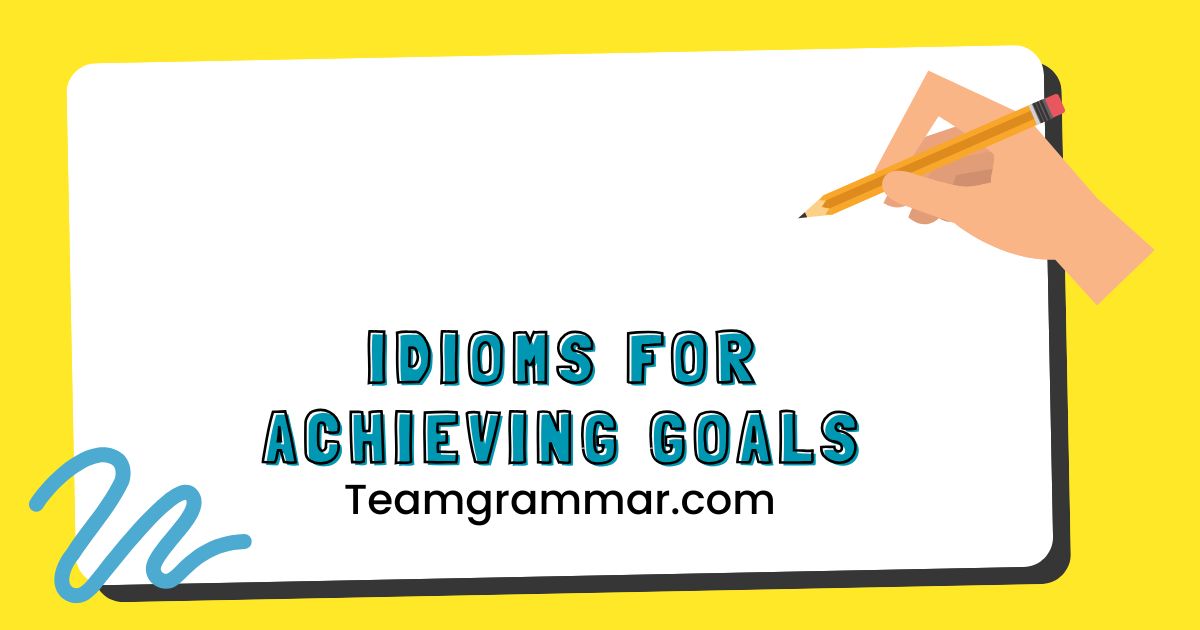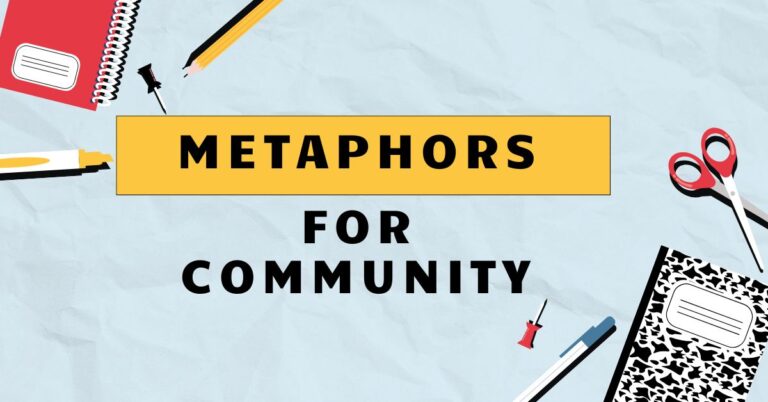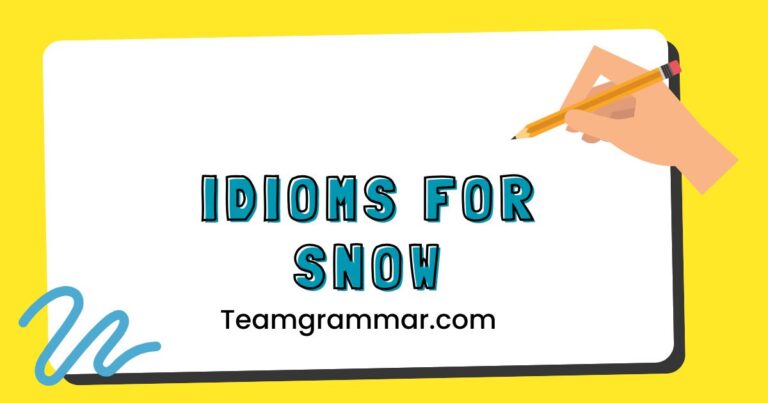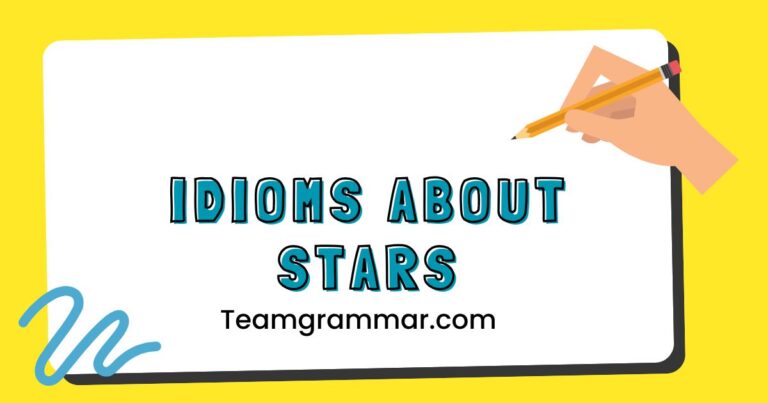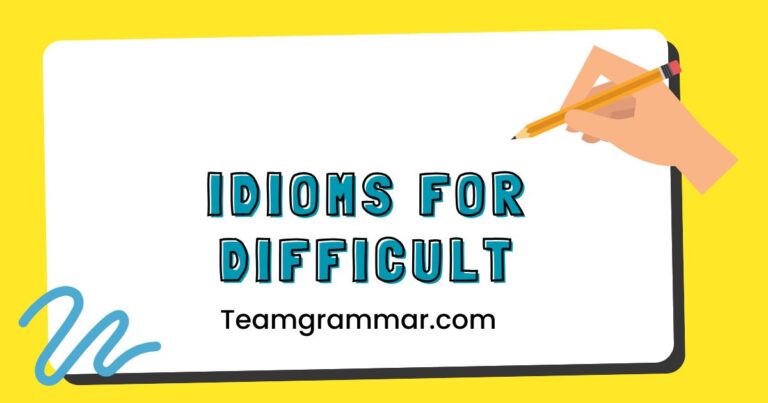35 Idioms for Achieving Goals: Mastering English Expressions
Understanding and using idioms is crucial for mastering English. Idioms add color and depth to communication, making it more engaging and nuanced.
Specifically, idioms related to achieving goals are essential for expressing ambition, perseverance, and success in a vivid and memorable way. This article is designed to help English learners, from intermediate to advanced levels, grasp and effectively use these powerful expressions in their everyday conversations and writing.
This comprehensive guide covers the definition, structure, and various types of goal-oriented idioms. It provides numerous examples, usage rules, common mistakes to avoid, and practice exercises to solidify your understanding.
Whether you are preparing for an English exam, aiming to improve your professional communication, or simply looking to enrich your vocabulary, this article will equip you with the knowledge and skills to use idioms confidently and accurately.
Table of Contents
- Definition of Goal-Oriented Idioms
- Structural Breakdown of Idioms
- Types and Categories of Goal-Oriented Idioms
- Examples of Goal-Oriented Idioms
- Usage Rules for Goal-Oriented Idioms
- Common Mistakes When Using Idioms
- Practice Exercises
- Advanced Topics in Idiomatic Usage
- Frequently Asked Questions
- Conclusion
Definition of Goal-Oriented Idioms
Goal-oriented idioms are fixed expressions in the English language that convey a specific meaning related to setting, pursuing, and achieving goals. These idioms cannot be understood literally from the individual words they contain; their meaning is figurative and culturally determined.
Understanding these idioms is crucial for comprehending spoken and written English, as they are frequently used in both formal and informal contexts.
These idioms often encapsulate complex ideas about ambition, dedication, strategic thinking, and the challenges faced in the pursuit of objectives. They add color and nuance to discussions about professional aspirations, personal development, and the overall journey towards success.
Recognizing and using these idioms effectively can significantly enhance one’s communication skills, making speech more engaging and relatable.
Classification: Goal-oriented idioms can be classified based on their primary focus, such as idioms related to effort, determination, success, planning, or overcoming obstacles. This classification helps learners understand the subtle differences in meaning and use each idiom appropriately.
Function:The primary function of these idioms is to provide a concise and vivid way to express complex ideas about goal achievement. They serve to emphasize the importance of hard work, perseverance, strategic thinking, and resilience in the face of adversity.
Moreover, they often add an emotional dimension to the communication, conveying enthusiasm, encouragement, or even a sense of humor.
Contexts:Goal-oriented idioms are used in a wide range of contexts, including business meetings, academic discussions, personal conversations, and motivational speeches. They are particularly prevalent in situations where there is a need to inspire, encourage, or provide insightful commentary on the process of achieving goals.
Understanding the appropriate context for each idiom is essential for using it effectively.
Structural Breakdown of Idioms
Idioms, by nature, have a fixed structure. This means that the words within an idiom cannot be changed or rearranged without altering or losing the intended meaning.
The structure of an idiom often defies typical grammatical rules, which is why literal translations are nonsensical.
Fixed Structure:The most important aspect of an idiom’s structure is its immutability. For example, the idiom “hit the nail on the head” cannot be changed to “strike the nail on the head” without sounding unnatural.
The specific wording is essential to preserving the idiom’s meaning and impact.
Figurative Language:Idioms rely heavily on figurative language, such as metaphors and similes. This means that the words are not meant to be taken literally.
Instead, they represent an abstract concept or idea. For example, “to go the extra mile” doesn’t literally mean walking a longer distance; it means putting in extra effort.
Grammatical Irregularities:Many idioms contain grammatical structures that would be considered incorrect in standard English. This is because idioms often originate from historical or colloquial usage, which may not adhere to modern grammatical rules.
For example, the idiom “by and large” doesn’t follow typical grammatical patterns, but its meaning is well-understood.
Variations:While idioms generally have a fixed structure, some may have minor variations. These variations usually involve the substitution of synonyms or the addition of clarifying words.
However, it is essential to be cautious when altering an idiom, as even small changes can affect its meaning or sound awkward.
Understanding the structural elements of idioms is crucial for both comprehension and usage. Recognizing the fixed nature, figurative language, and potential grammatical irregularities of idioms will help learners to use them accurately and effectively.
Types and Categories of Goal-Oriented Idioms
Goal-oriented idioms can be categorized based on the specific aspect of goal achievement they emphasize. This categorization helps learners understand the nuances of each idiom and use them appropriately in different contexts.
Here are some key categories:
Idioms Related to Effort and Hard Work
These idioms emphasize the importance of putting in the necessary work and dedication to achieve a goal. They often convey the idea of exertion, perseverance, and commitment.
Idioms Related to Determination and Perseverance
These idioms focus on the mental strength and resilience required to overcome obstacles and stay focused on a goal. They highlight the importance of not giving up, even in the face of challenges.
Idioms Related to Success and Achievement
These idioms describe the feeling of accomplishment and the rewards of achieving a goal. They often convey a sense of satisfaction, pride, and recognition.
Idioms Related to Planning and Strategy
These idioms emphasize the importance of careful planning, strategic thinking, and foresight in the pursuit of goals. They highlight the need to anticipate challenges and develop effective strategies to overcome them.
Idioms Related to Overcoming Obstacles
These idioms focus on the challenges and setbacks that can occur during the pursuit of a goal, and the importance of resilience and adaptability in overcoming them. They often convey the idea of facing adversity and emerging stronger.
By understanding these different categories, learners can choose the most appropriate idiom to convey their intended meaning and add depth to their communication.
Examples of Goal-Oriented Idioms
This section provides extensive examples of goal-oriented idioms, organized by category. Each example is accompanied by a definition and a sample sentence to illustrate its usage.
Idioms Related to Effort and Hard Work
These idioms highlight the importance of dedication and labor in achieving goals. They emphasize that success often requires significant exertion and commitment.
The following table provides a variety of idioms related to effort and hard work, along with their definitions and example sentences. These idioms can be used to describe situations where someone is putting in a lot of effort to achieve a goal, or to encourage someone to work harder.
| Idiom | Definition | Example Sentence |
|---|---|---|
| Burn the midnight oil | Work late into the night | She had to burn the midnight oil to finish the project on time. |
| Go the extra mile | Do more than what is expected | He always goes the extra mile for his clients, which is why they are so loyal. |
| Pull your weight | Do your fair share of the work | Everyone needs to pull their weight if we want to finish this project on time. |
| Keep your nose to the grindstone | Work hard and diligently | If you keep your nose to the grindstone, you’ll eventually achieve your goals. |
| Sweat blood | Work extremely hard | He sweated blood to get the company off the ground. |
| Work your fingers to the bone | Work extremely hard, especially physically | The farmers worked their fingers to the bone to bring in the harvest. |
| Give it your all | Put in maximum effort | If you give it your all, you’ll have no regrets, regardless of the outcome. |
| Leave no stone unturned | Try every possible course of action | The detectives left no stone unturned in their search for the missing child. |
| Be an eager beaver | A person who is very hardworking and enthusiastic. | She’s such an eager beaver, always the first to volunteer for new tasks. |
| Plug away | To work continuously and steadily. | He just kept plugging away at his studies, even when it got difficult. |
| Put your shoulder to the wheel | To work hard at a task, especially together with other people. | If we all put our shoulder to the wheel, we can get this project done by the deadline. |
| Slave away | To work very hard with little or no rest | She slaved away at her desk all day to meet the deadline |
| Go all out | To make the greatest effort possible | They went all out to make their wedding unforgettable. |
| Knuckle down | To start working hard, especially when you should have done it earlier | She needs to knuckle down if she wants to pass her exams |
| Keep at it | Continue working | It’s hard, but you have to keep at it if you want to see results. |
| Be up to one’s elbows in work | Very busy with work | The accountant is up to his elbows in work during tax season. |
| Work like a dog | To work very hard | She worked like a dog to provide for her family. |
| Hammer away at something | To try hard to achieve something, often over a long period of time | He hammered away at his novel for years before it was finally published. |
| Get cracking | To start doing something quickly | We need to get cracking if we want to finish on time. |
| Put one’s back into it | To put a lot of effort into something | He really put his back into it and managed to finish the job in record time. |
| Be snowed under | To have too much work | I’m snowed under with paperwork this week. |
| Burn the candle at both ends | To exhaust oneself by doing too much | Working two jobs and going to school is like burning the candle at both ends. |
| Rise and grind | To wake up early and start working hard | Every morning, he would rise and grind to get ahead in his career. |
| Be on the grind | To be working hard to achieve something | She’s always on the grind, trying to improve her skills and advance in her field. |
| Be a workaholic | A person who is addicted to work | He’s such a workaholic, he never takes a day off. |
Idioms Related to Determination and Perseverance
These idioms emphasize the importance of resoluteness and persistence in achieving goals. They highlight the need to stay focused and committed, even when faced with obstacles or setbacks.
The following table provides a variety of idioms related to determination and perseverance, along with their definitions and example sentences. These idioms can be used to describe situations where someone is showing great determination to achieve a goal, or to encourage someone to persevere in the face of challenges.
| Idiom | Definition | Example Sentence |
|---|---|---|
| Keep your eye on the ball | Stay focused on your goal | It’s easy to get distracted, but you need to keep your eye on the ball. |
| Stay the course | Continue doing something until it is finished, even if it is difficult | Despite the challenges, he stayed the course and completed the project successfully. |
| Hang in there | Don’t give up | I know it’s tough, but hang in there, you’re almost there. |
| Stick to your guns | Maintain your position or opinion firmly | She stuck to her guns and refused to compromise on her principles. |
| Press on | Continue doing something in a determined way | Despite the setbacks, he pressed on with his research. |
| Push through | Continue with something despite difficulties | We need to push through this difficult phase to achieve our long-term goals. |
| Hold your ground | Maintain your position in an argument or situation | She held her ground against the opposition and defended her ideas. |
| Never say die | Never give up | He never says die, even when things look bleak. |
| Go the distance | Continue until the end | She’s determined to go the distance and finish the marathon. |
| Tough it out | Endure a difficult situation | They had to tough it out during the recession to keep their business afloat. |
| Stand one’s ground | To not change one’s opinion or position | She stood her ground despite the pressure from her colleagues. |
| Keep one’s chin up | To remain cheerful during difficult times | Even though he lost the competition, he kept his chin up and vowed to try again next year. |
| Ride out the storm | To survive a difficult period | The company managed to ride out the storm of the financial crisis. |
| Weather the storm | To survive a difficult situation | The small business weathered the storm of the pandemic and is now thriving. |
| Keep pushing | To continue striving towards a goal | Even when faced with setbacks, he kept pushing towards his dream. |
| Stay the course of action | To follow a certain path or method until the end | Despite the challenges, he stayed the course of action and achieved his objective. |
| Hold on tight | To persevere through a difficult situation | Just hold on tight, things will get better soon. |
| Dig your heels in | To refuse to do something or change your mind | She dug her heels in and refused to compromise on the deal. |
| Forge ahead | To continue moving forward despite difficulties | Despite the obstacles, they decided to forge ahead with their project. |
| Never give up | To persist and not surrender | Never give up on your dreams, no matter how hard they seem to achieve. |
| Have the courage of one’s convictions | To act according to one’s beliefs despite opposition | She had the courage of her convictions and stood up for what she believed in, even when it was unpopular. |
| Keep plugging away | To continue working steadily and persistently | He kept plugging away at his studies, even when he felt discouraged. |
| Stay the distance | To continue until the end of a process or activity | It’s a long and challenging project, but we’re determined to stay the distance and see it through to completion. |
| Keep the faith | To continue to believe in something despite difficulties | Even when times were tough, they kept the faith that things would eventually improve. |
| Rise above | To overcome a difficult situation or challenge | Despite the obstacles in her path, she managed to rise above and achieve her goals. |
Idioms Related to Success and Achievement
These idioms describe the feeling of accomplishment and the rewards of achieving a goal. They often convey a sense of satisfaction, pride, and recognition.
The following table provides a variety of idioms related to success and achievement, along with their definitions and example sentences. These idioms can be used to describe situations where someone has achieved a goal, or to celebrate someone’s success.
| Idiom | Definition | Example Sentence |
|---|---|---|
| Hit the jackpot | Achieve a great success or win a large amount of money | After years of hard work, he finally hit the jackpot with his new invention. |
| Make it to the top | Achieve the highest level of success in a particular field | She worked tirelessly and eventually made it to the top of her profession. |
| Come out on top | Be successful in a competition or conflict | Despite the challenges, they came out on top and won the championship. |
| Reap the rewards | Enjoy the benefits of your hard work | After years of dedication, she is finally reaping the rewards of her efforts. |
| Strike gold | Discover something valuable or have a great success | The company struck gold with their new product, which became an instant hit. |
| Reach for the stars | Aim for ambitious goals | She always encouraged her children to reach for the stars and pursue their dreams. |
| Get a foot in the door | Get a first opportunity to work in a particular field | Interning at the company helped him get a foot in the door in the industry. |
| Make a breakthrough | Make a significant discovery or achievement | The scientists made a breakthrough in cancer research, offering new hope for patients. |
| Go places | Be successful in the future | With her talent and determination, she is sure to go places in the music industry. |
| Take off | Become successful or popular very quickly | His career took off after he landed the lead role in the hit television series. |
| Be on top of the world | To be extremely happy because things are going well | After winning the championship, the team felt like they were on top of the world. |
| Achieve one’s potential | To fully develop one’s abilities and talents | Through hard work and dedication, she was able to achieve her potential and become a successful entrepreneur. |
| Make a killing | To earn a lot of money quickly | He made a killing on the stock market. |
| Have the Midas touch | To be successful in everything you do | It seems like she has the Midas touch, every business she starts turns into a success. |
| Land on one’s feet | To be successful after a difficult situation | Despite losing his job, he managed to land on his feet and find a new one quickly. |
| Come up trumps | To succeed unexpectedly | Despite the odds, the team came up trumps and won the competition. |
| Get one’s act together | To organize oneself and start performing well | He finally got his act together and started excelling in his studies. |
| Get over the hump | To overcome the most difficult part of a process | Once we get over the hump of setting up the business, it will be much easier. |
| Live the dream | To live a life that one has always wanted | She’s finally living the dream, traveling the world and pursuing her passion. |
| Reach the summit | To reach the highest point or level of something | After years of hard work, she finally reached the summit of her career. |
| Come up smelling of roses | To emerge from a difficult situation with one’s reputation intact | Despite the scandal, he managed to come up smelling of roses. |
| Hit the bullseye | To achieve a goal or target perfectly | The marketing campaign hit the bullseye and resulted in a significant increase in sales. |
| Make one’s mark | To have a significant impact or achievement | She wanted to make her mark on the world through her art. |
| Take the world by storm | To become very popular or successful very quickly | The new band took the world by storm with their hit song. |
| Be a roaring success | To be extremely successful | The event was a roaring success, with record attendance and positive feedback. |
Idioms Related to Planning and Strategy
These idioms emphasize the importance of careful planning, strategic thinking, and foresight in the pursuit of goals. They highlight the need to anticipate challenges and develop effective strategies to overcome them.
The following table provides a variety of idioms related to planning and strategy, along with their definitions and example sentences. These idioms can be used to describe situations where someone is carefully planning their actions, or to emphasize the importance of strategic thinking.
| Idiom | Definition | Example Sentence |
|---|---|---|
| Have a game plan | Have a strategy or plan of action | Before starting the project, they needed to have a game plan to ensure success. |
| Map out a strategy | Develop a detailed plan | The team mapped out a strategy to increase sales in the next quarter. |
| Think outside the box | Think creatively and unconventionally | To solve the problem, we need to think outside the box. |
| Play your cards right | Act wisely to achieve a desired outcome | If you play your cards right, you could get a promotion. |
| Lay the groundwork | Prepare the foundation for future success | They laid the groundwork for the new project by conducting thorough research. |
| Get your ducks in a row | Organize things efficiently | Before launching the new product, we need to get our ducks in a row. |
| See the big picture | Understand the overall context and implications | It’s important to see the big picture when making strategic decisions. |
| Read between the lines | Understand the hidden meaning or implications | You need to read between the lines to understand what he’s really saying. |
| Plan ahead | Think about and prepare for the future | It’s always good to plan ahead to avoid unexpected problems. |
| Look before you leap | Consider the consequences before taking action | Remember to look before you leap when making important decisions. |
| Think on one’s feet | To react quickly and intelligently to unexpected situations | The speaker had to think on his feet when the projector broke down during the presentation. |
| Have a strategy up one’s sleeve | To have a secret or hidden plan | The negotiator seemed to have a strategy up his sleeve, as he managed to secure a better deal than expected. |
| Take a calculated risk | To make a decision after carefully considering the possible outcomes | The entrepreneur decided to take a calculated risk by investing in the new technology. |
| Size up the situation | To assess or evaluate a situation before taking action | Before making a move, the detective sized up the situation to determine the best course of action. |
| Be on the same page | To have a shared understanding or agreement | It’s important for all team members to be on the same page before starting the project. |
| Keep one’s options open | To avoid committing to one course of action | The investor decided to keep his options open before making a final decision on where to invest his money. |
| Play the long game | To focus on long-term goals rather than immediate gains | The company decided to play the long game and invest in research and development for future growth. |
| Stay one step ahead | To anticipate and prepare for future events | The successful manager always tried to stay one step ahead of the competition. |
| Have a plan B | To have an alternative plan in case the original one fails | It’s always a good idea to have a plan B in case things don’t go as expected. |
| Make a beeline for something | To go straight for something without stopping | As soon as she entered the library, she made a beeline for the new arrivals section. |
| Cross that bridge when you come to it | Deal with a problem when it actually arises, not before | Let’s not worry about the potential difficulties now; we’ll cross that bridge when we come to it. |
| Cover all the bases | To prepare for every possibility | The event planner made sure to cover all the bases to ensure a smooth and successful event. |
| Get your bearings | To understand your position or situation | After arriving in the new city, it took him a while to get his bearings before he could navigate effectively. |
| Go back to the drawing board | To start planning something again from the beginning | The initial design failed, so the engineers had to go back to the drawing board. |
| Keep all one’s eggs in one basket | To put all one’s resources or efforts into one thing | It’s risky to keep all your eggs in one basket; you should diversify your investments. |
Idioms Related to Overcoming Obstacles
These idioms focus on the challenges and setbacks that can occur during the pursuit of a goal, and the importance of resilience and adaptability in overcoming them. They often convey the idea of facing adversity and emerging stronger.
The following table provides a variety of idioms related to overcoming obstacles, along with their definitions and example sentences. These idioms can be used to describe situations where someone is facing challenges, or to encourage someone to persevere in the face of adversity.
| Idiom | Definition | Example Sentence |
|---|---|---|
| Get over a hurdle | Overcome a problem or obstacle | They managed to get over the hurdle of securing funding for their project. |
| Turn the tide | Reverse a negative trend or situation | The new strategy helped to turn the tide and improve the company’s performance. |
| Rise to the occasion | Perform well in a difficult situation | She rose to the occasion and delivered an outstanding presentation. |
| Weather the storm | Survive a difficult period | The company managed to weather the storm of the economic recession. |
| Come through | Succeed in doing something difficult | Despite the challenges, they came through and completed the project on time. |
| Jump through hoops | Go through a series of difficult or unnecessary steps | They had to jump through hoops to get the necessary permits. |
| Clear the way | Remove obstacles or difficulties | The team worked hard to clear the way for the new project. |
| Fight an uphill battle | Face a difficult or challenging situation | They were fighting an uphill battle to save the company from bankruptcy. |
| Get a second wind | Regain energy or motivation after a period of difficulty | After a short break, she got a second wind and finished the race strongly. |
| Turn over a new leaf | Make a fresh start | He decided to turn over a new leaf and start living a healthier lifestyle. |
| Bite the bullet | To face a difficult situation with courage | She had to bite the bullet and tell her boss about the mistake she made. |
| Be in the same boat | To be in the same difficult situation as someone else | We’re all in the same boat when it comes to dealing with these challenges. |
| Take the bull by the horns | To confront a difficult situation directly | He decided to take the bull by the horns and address the issue head-on. |
| Turn lemons into lemonade | To make something positive out of a negative situation | She managed to turn lemons into lemonade by finding a new opportunity after losing her job. |
| When the going gets tough, the tough get going | When faced with difficulties, strong people take action | When the going gets tough, the tough get going, so we need to step up and find a solution. |
| Swim against the tide | To go against the prevailing opinion or trend | He decided to swim against the tide and pursue his unconventional career path. |
| Come hell or high water | No matter what difficulties may arise | Come hell or high water, we will finish this project on time. |
| Get a foot hold | To establish oneself in a new position or situation | The new company is trying to get a foothold in the market by offering competitive prices. |
| Hit a brick wall | To encounter an obstacle that is difficult to overcome | The negotiations hit a brick wall when the two sides couldn’t agree on the terms. |
| Keep your head above water | To manage to survive in a difficult situation | She worked hard to keep her head above water during the economic
Usage Rules for Goal-Oriented IdiomsUsing idioms correctly can significantly enhance your communication, but it’s essential to follow certain rules to avoid misusing them. Here are some key guidelines to keep in mind when using goal-oriented idioms:
Following these rules will help you use goal-oriented idioms effectively and appropriately, enhancing your communication and making your language more engaging. Common Mistakes When Using IdiomsEven advanced English learners can make mistakes when using idioms. Here are some common pitfalls to avoid:
By being aware of these common mistakes, you can avoid them and use idioms more effectively in your communication. Practice ExercisesTo solidify your understanding of goal-oriented idioms, try these practice exercises: Exercise 1: Fill in the BlanksComplete the following sentences with the appropriate idiom from the list below:
Idiom List: keep your eye on the ball, weather the storm, get over a hurdle, turn over a new leaf, burn the midnight oil Answers:
Exercise 2: Match the Idiom to its MeaningMatch each idiom with its correct meaning:
Meanings:
Answers:
Exercise 3: Use the Idiom in a SentenceWrite a sentence using each of the following idioms:
Sample Answers:
Advanced Topics in Idiomatic UsageFor advanced learners, understanding the nuances and origins of idioms can further enhance their usage. Here are some advanced topics to explore:
Delving into these advanced topics will not only improve your understanding of idioms but also enhance your overall command of the English language. Frequently Asked QuestionsWhat is the difference between an idiom and a proverb?An idiom is a phrase whose meaning is not predictable from the usual meanings of its constituent elements (e.g., “kick the bucket” means “to die”). A proverb, on the other hand, is a short, well-known saying that expresses a general truth or piece of advice (e.g., “actions speak louder than words”). How can I improve my understanding of idioms?To improve your understanding of idioms, read widely, listen to native speakers, and pay attention to the context in which idioms are used. Keep a notebook of new idioms you encounter and practice using them in your own speech and writing. Are idioms the same in all English-speaking countries?No, idioms can vary significantly between different English-speaking countries and regions. Some idioms are specific to certain cultures or dialects, while others may have different meanings in different places. Is it okay to use idioms in formal writing?It depends on the context and audience. In general, it’s best to use idioms sparingly in formal writing, as they can sometimes be perceived as informal or colloquial. However, if used appropriately, they can add color and depth to your writing. How do I know if I’m using an idiom correctly?To ensure you’re using an idiom correctly, check its definition and usage in a reliable dictionary or online resource. Pay attention to the context in which the idiom is used and make sure it accurately conveys your intended meaning. ConclusionMastering goal-oriented idioms is an invaluable asset for anyone looking to enhance their English language skills. These expressions not only enrich your vocabulary but also provide a deeper understanding of the cultural nuances embedded within the language. By understanding the definitions, structural breakdowns, and usage rules of these idioms, you can communicate more effectively and expressively. Remember to practice using these idioms in various contexts and be mindful of common mistakes to avoid. As you continue to expand your knowledge and refine your usage, you’ll find that idioms become an integral part of your communication, adding color, depth, and authenticity to your language. Whether you’re aiming for professional success, academic excellence, or personal growth, mastering goal-oriented idioms will undoubtedly help you articulate your ambitions and achievements with greater clarity and impact. |

